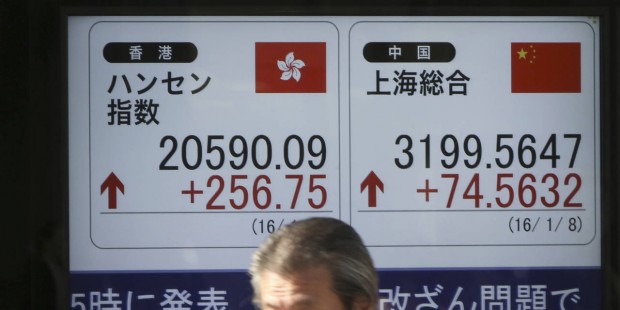-
Tips for becoming a good boxer - November 6, 2020
-
7 expert tips for making your hens night a memorable one - November 6, 2020
-
5 reasons to host your Christmas party on a cruise boat - November 6, 2020
-
What to do when you’re charged with a crime - November 6, 2020
-
Should you get one or multiple dogs? Here’s all you need to know - November 3, 2020
-
A Guide: How to Build Your Very Own Magic Mirror - February 14, 2019
-
Our Top Inspirational Baseball Stars - November 24, 2018
-
Five Tech Tools That Will Help You Turn Your Blog into a Business - November 24, 2018
-
How to Indulge on Vacation without Expanding Your Waist - November 9, 2018
-
5 Strategies for Businesses to Appeal to Today’s Increasingly Mobile-Crazed Customers - November 9, 2018
3 reasons for concern about the Chinese economy
Stocks rose in Taiwan and were mixed in south-east Asia. According to market experts, it failed to work as anticipated in real situations and was found to be doing more bad than good. Any circuit breakers should have taken into account the volatility in a market when some 90% of investors are retail and the market prohibits intraday trading.
Advertisement
Chinese stock markets have cooled down on Friday after creating buzz in the global markets.
With the circuit breaker deactivated late on Thursday, the CSI300 index was up 1.75 percent at 3,351.97 points in morning trade on Friday, while the Shanghai Composite Index was up 1.6 percent at 3,175.38 points.
Government-linked entities stepped in to buy stocks for at least the second time this week to shore up the market, Bloomberg reported, quoting people familiar with the matter. China’s stock markets have little connection to the rest of its economy, but two sharp price declines this week have focused attention on the slowdown in Chinese growth.
China’s central bank guided the yuan a shade higher Friday setting the yuan reference rate at 6.5636 against the dollar, up 0.02 percent from Thursday’s fix and higher than the yuan’s closing rate of 6.5929 in onshore trading on Thursday. CSI 300 benchmark traded for the whole day after yesterday’s early suspension within half an hour of the opening bell.
Analysts said Beijing’s introduction of the “circuit breaker” this week had proved counter-productive, with investor fears of being unable to sell unwanted stocks outweighing any reassurance over market stability.
A Chinese investor monitors stock prices in a brokerage house in Beijing, Friday, Jan. 8, 2016. For the week the index shed 6.5 per cent, or 1,429 points, its worst weekly drop since September 2011.
After a turbulent start of the year for the Chinese stock markets, as the newly implemented circuit breaker mechanism was activated twice, the Chinese regulators have made a decision to suspend the solution, in order to keep the markets stable.
The People’s Bank of China has allowed the yuan to decline by about 6 per cent against the dollar since August after loosening its tie to the US currency. S&P 500 futures were up 1.2 percent. “China may need to learn from their experiences to avoid frequently triggering the mechanism, so the current trigger points of 5 percent and 7 percent may have to be changed”.
“The wild market movement appears to be out of the authorities’ expectation, and we saw aggressive intervention in the offshore yuan market”, said Commerzbank senior economist Zhou Hao.
The central bank’s policymakers want to see stronger wage growth among other factors before raising rates from their record low levels. Japan’s Nikkei 225 opened lower Friday but pared losses and was up 0.3 percent by midmorning.
A flurry of Chinese economic data in the coming weeks is likely to show activity in the world’s second-largest economy continued to slow in December, adding to concerns about its economic outlook for 2016.
The Shanghai Composite Index, after trading down as much as 1.89%, rebounded sharply and was at 3,205.67, up 2.58%, while Hong Kong’s Hang Seng was trading higher by 0.76% at 20,487.56.
Advertisement
OIL: In energy trading, USA crude sank Thursday to its lowest level in 12 years on fears Chinese demand might weaken.





























